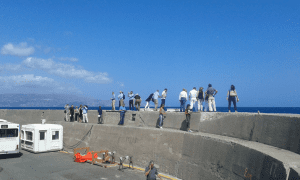
Onsite evaluation of the Heraklion Port
Poseidon Med II held on 20th – 22nd July 2016 a technical & dissemination workshop focused on LNG bunkering potential at Heraklion Port
The three-day event started with a technical workshop and on-site survey of Heraklion Port area, assessing the prospects for developing LNG bunkering installations within the port. During the workshop 35 participants actively contributed to open group discussions on the operability issues surrounding LNG bunkering, technology, safety provisions and regulations. A fuel calculation review of LNG fuel requirements for one currently operating type of fast ferry on the Crete-Cyclades route was also estimated. Additionally, significant issues on LNG supply chain were critically evaluated, taking into account the potential for the wider use of natural gas in other sectors. Possible site positions for the small-scale LNG installations were proposed and discussed during the workshop.

Another view from the onsite evaluation
“LNG is one of the cleanest burning fossil fuels. It is factually proven the most safe and technologically mature green marine fuel. Over 50 ports globally have planned the development of LNG bunkering infrastructure”, highlighted Thanos Koliopulos, LR Global Special Projects Manager, who chaired the workshop.
A list of areas for further action and assessment was developed and this is to be further detailed by the project partners.

Poseidon Med II technical workshop at Heraklion Port
Day 3 (22nd July) was dedicated to raise awareness about the Poseidon Med II project and its objectives to local community and stakeholders from the industrial, academic and business sector. During the event, hosted by Heraklion Port Authority at Heraklion Chamber of Commerce & Industry, the project representatives from the Public Gas Corporation (DEPA), the Hellenic Gas Transmission System Operator (DESFA), Lloyd’s Register, Rogan Associates, the Centre of Research & Technology Hellas and three participating ports (Igoumenitsa, Piraeus, Venice) presented the scope and aspects of the project, giving emphasis to the importance of the use of LNG as marine fuel for the island of Crete.

Dissemination session presenting Poseidon MedII project to local stakeholders
“The Management of Heraklion Port Authority strongly supports ecofriendly initiatives and actions. Our mission is the Port of Heraklion truly becomes a “green” port, protecting the environment, improving day by day its environmental footprint. In this context, we participate in the European project Poseidon Med II which aims to bring about the wide adoption of LNG as alternative fuel for shipping. For this purpose, the port undertakes relevant technical studies for the preparation and establishment of LNG unit for storage and bunkering operations. This project will hopefully lead the Port of Heraklion to a new energy status with obvious positive impact on new ships attraction, on the local economy and on the general operations of the port”, noted Apollon Filippis, Chairman & Managing Director of Heraklion Port Authirity S.A.
George Polychroniou, Project Manager of Poseidon Med II- Executive Director, Strategy, Development, Administration & IT, of Public Gas Corporation of Greece (DEPA) highlighted: “Port of Heraklion is going to play an important role in the introduction of LNG as marine fuel in the East Mediterranean. LNG provides significant environmental benefits compared to the alternative fuels, in term of reducing emissions. Furthermore, the establishment of small scale LNG infrastructure at ports gives the opportunity to the wider use of natural gas in other sectors”.
Parallel to the workshops, meetings were occurred between the Prefecture of Crete, the Municipality of Heraklion and project representatives.
Similar technical & dissemination workshops will take place to other ports of Poseidon Med II project, the following months.
What is Poseidon Med II project?
Poseidon Med II project is a practical roadmap which aims to bring about the wide adoption of LNG as a safe, environmentally efficient and viable alternative fuel for shipping and help the East Mediterranean marine transportation propel towards a low-carbon future. The project, which is co-funded by the European Union, involves three countries Greece, Italy and Cyprus, six European ports (Piraeus, Patras, Limassol, Venice, Heraklion, Igoumenitsa) as well as the Revithoussa LNG terminal. The project brings together top experts from the marine, energy and financial sectors to design an integrated LNG value chain and establish a well-functioning and sustainable LNG market.





